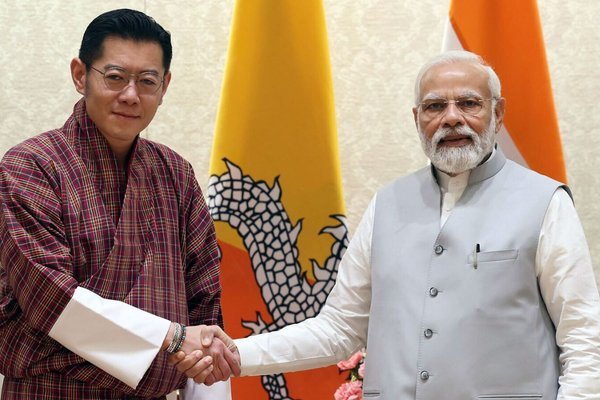The Union Cabinet recently approved Memorandum of Understandings (MoUs) between India and Bhutan for energy efficiency, energy resources, and food security.
Key Highlights of the Memorandum of Understandings (MoUs):
MoU on Energy Efficiency and Conservation:
- This landmark agreement aims to foster bilateral cooperation between India and Bhutan in the field of energy efficiency.
- It was signed between the Bureau of Energy Efficiency (BEE) of India’s Ministry of Power and Bhutan’s Department of Energy, Ministry of Energy and Natural Resources.
- The MoU was prepared by the Ministry of Power in consultation with Ministry of External Affairs (MEA) and Department for promotion of industry and internal Trade (DPIIT).
- It will enable an exchange of Information, data and technical experts related to energy efficiency and energy conservation between India and Bhutan.
- The MoU will analyze energy efficiency policies and cooperation in the field of energy efficiency research and technology deployment.
Key Provisions:
- India will extend its support to Bhutan in enhancing energy efficiency within the household sector through promotion of India’s star labeling program under BEE.
- India will share its expertise in the development of building codes tailored to Bhutan’s climate conditions.
- This can contribute to the creation of a pool of energy professionals in Bhutan through the training of energy auditors.
- The initiative also focuses on training retailers to disseminate energy-efficient products among consumers, emphasizing the savings from using star-rated appliances.
- This cooperation can support Bhutan in the development and implementation of Standards and Labelling schemes for energy-intensive appliances.
MoU on supply of petroleum, oil, and lubricants:
- The primary aim is to enhance economic and commercial ties between India and Bhutan, transcending gender, class, or income biases.
- It targets the hydrocarbon sector, seeking to benefit India and its citizens through improved trade relations with Bhutan.
- One of the key benefits is bilateral trade in the hydrocarbon sector, ensuring a secure and long-term supply of petroleum products to Bhutan.
MoU on Food Security:
- An Agreement between Bhutan Food and Drug Authority (BFDA) and Food Safety and Standards Authority of India (FSSAI) was signed.
- It will facilitate the trade between two neighboring countries in the areas of food safety.
- BFDA will issue a Health Certificate as proof of compliance with the requirements prescribed by FSSAI, while exporting the products to India.
- This will promote Ease of Doing Business and will reduce compliance costs on both sides.
Significance of India- Bhutan MoUs:
- India-Bhutan relations have been strong since India’s independence, especially after the Treaty of Friendship and Cooperation since 1949.
- The agreements can address the rising demand for electrical energy through the preference for high-efficiency appliances.
- It will help Bhutan to ensure the availability of energy-efficient products in the market.
- This would strengthen economic cooperation between the two nations and contribute to India’s goals towards the vision of Aatmanirbhar Bharat (Self-Reliant India).
Location of Bhutan:

- Bhutan is a landlocked country of south-central Asia, located on the eastern ridges of the Himalayas.
- It shares northern and western boundaries with the Tibet Autonomous Region (part of China).
- It borders Indian states of West Bengal and Assam in the Duars Plain to the south of Himalayan range and Arunachal Pradesh to the east and Sikkim to the southwest.
Ref:Source
| UPSC IAS Preparation Resources | |
| Current Affairs Analysis | Topperspedia |
| GS Shots | Simply Explained |
| Daily Flash Cards | Daily Quiz |



